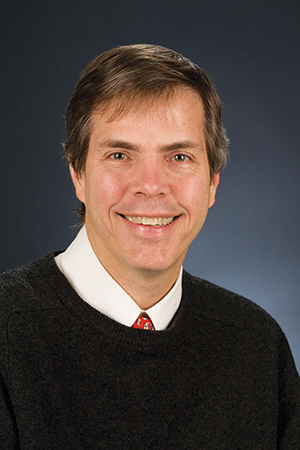From the Physician's Desk

An interview with John Byrd, MD
John Byrd, MD, is a board-certified hematologist whose areas of focus are chronic lymphocytic leukemia (CLL) and acute myeloid leukemia (AML). As the D. Warren Brown Chair of Leukemia Research, he serves as a Distinguished University Professor of Medicine, Medicinal Chemistry and Pharmacy for The Ohio State University. He is also a member of the National Cancer Institute’s Leukemia Steering Committee, Chair of the Leukemia and Correlative Science Committee within the Alliance for Clinical Trials in Oncology and a member of the American Society of Clinical Investigation. Dr. Byrd and his team have extensive experience treating patients with novel therapeutics. As part of clinical trials, and he has been intimately involved in the development of drugs that are changing the course of CLL treatment.
CLL treatments have been in the spotlight recently. Can you explain why these treatments are considered groundbreaking?
CLL is the most prevalent type of leukemia in older adults, and it often goes unrecognized for a long period because it is asymptomatic, which means the patients don’t show any symptoms. Once it is diagnosed, it can either be indolent (slow growing) or aggressive.
The treatments you refer to center around the vast improvements in targeted medicine. The immunotherapy drugs that have been developed recently have really impacted people’s lives. In treating CLL with immunotherapy, we’ve seen greatly improved response and prolonged survival.
What do you tell your patients when they are diagnosed with CLL?
I talk about the different tests we will run to find out how their type of CLL will behave. I try my best to reassure them about the new therapies we have for both low-risk and high-risk CLL, and we discuss the complications associated with treatment and how they may be affected.
I make them aware of the risk of secondary cancers, and I encourage them to keep up with their regular health care needs, such as getting the flu vaccine – although avoiding live vaccines is very important – and staying on top of preventive cancer screenings, such as seeing their dermatologist for skin cancer checks and melanoma prevention.
Seeking second opinions is always good advice and, along with that, I encourage patients to find a center that has experience treating CLL. They can continue to see their local oncologist, but I recommend adding in visits with someone who specializes in the disease. So many advancements are happening all the time with every type of cancer. It’s impossible for an oncologist to be on the forefront of every cancer type, especially a less common one like CLL.
I also encourage patients to learn about CLL. Do research, read and ask questions. The more they understand, the better they will feel about what is ahead.
With the new treatments available, do you recommend clinical trials?
Absolutely. How we choose treatment depends on the individual’s characteristics, such as age and if certain genetic mutations are present, but clinical trials are how we got to this point. We still have questions to answer, so new trials that combine novel therapies, such as CAR T-cells, are underway. These are exciting trials, and the results are promising. We are seeing abbreviated therapies and longer remissions. The ultimate goal is complete remission and to be off therapy.
Some people still believe that clinical trials are a last resort. If they come to me with that impression, I tell them about how far we’ve come from the clinical trials of 20 years ago. The trials are much more risk-averse now. On top of that, patients who choose to be on them get the benefit of seeing their regular doctor along with a whole group of people who are working with the trial.
How important is support when you have CLL?
Having family support is always helpful. There are also organizations, such as the Leukemia & Lymphoma Society, the CLL Foundation and local centers, that offer additional support. For example, there are programs that put newly diagnosed patients in touch with other patients so they can hear firsthand how others are managing their disease. Patients can tap into these types of resources to access educational information, too, about things like autoimmune complications and possible side effects.
I always tell patients they have every right to be scared and nervous, but I try to alleviate some of that fear by telling them about all the incredible progress we’ve made treating CLL. With that in mind, I advise them not to do something they hadn’t already planned to do, such as retire or run off and spend their life savings in Atlantic City. Instead, I tell them they have something we expect them to be able to live with.
Do you expect this positive trend in CLL treatment options to continue?
I do, in large part because of clinical trials. One particularly successful therapy has a 90+ percent response rate, and it enables patients to treat CLL much as they would high blood pressure, with a daily oral pill.
We’ve been blessed in the CLL world to have a lot of support for research by the National Cancer Institute and philanthropic organizations. Along with their involvement, grants and the support of the CLL community, in general, we are able to take our research to the next level and continue to develop these life-altering therapies. It’s very satisfying to contribute to research that directly impacts patients’ lives.
I’m happy to be in the CLL research field. Academic medicine is competitive, and that’s a good thing. It keeps things prioritized.
Best of all, I see a direct correlation between these improvements and the number of patients I see each week in clinic and in treatment. We’re gaining new patients all the time, but, more important, we’re not losing them. It’s humbling to be a part of it.


